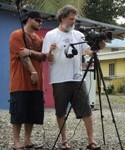RPCV Film maker Jack Niedenthal (Marshall Islands 1981-84)
In 1987 he assumed the duties of the Trust Liaison for the People of Bikini, which includes the management and coordination of the funds allocated by the United States government to compensate the Bikinians for their suffering and to facilitate the radiological cleanup of Bikini Atoll. He acts as a liaison for the Council to the media, the U.S. government and its various agencies, the scientists who work on Bikini, the Bikini Council’s attorney, trustees, money managers, construction companies, engineers, project managers, auditors and business associates. The Trust Liaison also coordinates travel schedules, is used as an advisor and translator, manages the Bikinians’ scholarship program, and is responsible for the Bikini Council’s accounting.
The government of the Marshall Islands awarded him an honorary “Public Benefit” Marshallese citizenship in December of 2000.
Along with his book about the people of Bikini, For the Good of Mankind(2001), he has published a number of articles, academic papers and photos about the Bikinians in The Guardian (United Kingdom), World View, The Health Physics Journal, the San Francisco Chronicle and others. He also published a chapter about Bikini Atoll in the book, Everything You Know is Wrong, compiled by Russ Kick.
In 2008, while with his 10 year old son, Max, in a local video store surrounded by the typical Hollywood-based fare, his son asked,

Jack and his son, Jukulius
“Why are there no movies in Marshallese?” Realizing what a tragedy it was for the children of the Marshall Islands to grow up without seeing a film in their own language, set in their own country and dealing with issues unique to their own culture, Jack decided to venture into filmmaking. At the age of 50 with no filmmaking experience whatsoever, he founded Microwave Films of the Marshall Islands, bought some filmmaking equipment and, along with co-director and co-producer Suzanne Chutaro (the daughter of a former RMI Peace Corps Volunteer Joe Murphy), made a Marshallese children’s movie, a fairy tale about a mythical Marshallese sprite, entitled Ña Noniep(I am the Good Fairy, 2009). This film was followed by 3 more feature length films in the Marshallese language, Yokwe Bartowe(Poor Bartowe, 2010), Lañinbwil’s Gift (2011, a film that won numerous awards including “Best of Festival” at the Guam International Film Fest and “Best Foreign Film” at the Hawaii Ocean Film Festival), and now, Ainikien Jidjid ilo Boñ(The Sound of Crickets at Night), a narrative feature film about the people of Bikini Atoll that has already won the Atlantis Award for Foreign Feature Films at the 2012 New York based Moondance International Film Festival, the 2012 Grand Jury Award for Achievement in Acting at the Guam International Film Festival, and was an Official Selection at the prestigious 2012 Hawaii International Film Festival. The film has been submitted to numerous high profile film festivals in the US, Europe and Australia.
The members of Microwave Films are currently at work on their 5th feature film.]
A recent review of The Sound of Crickets at Night:
Islands-based filmmakers Jack Niedenthal and Suzanne Chutaro have created a provocative and moving drama that weaves three stories of loss and rue into a memorable work of art.
The elderly Jebuki is the patriarch of a fractured family. Forcibly evacuated from Bikini Atoll prior to the atomic weapons testing in 1950s, he has lived in an uneasy exile on Ejit Island in the Marshall Islands. In his old age, he finds himself in financial straits and with recurring chest pains.
Jebuki is also the custodian of Kali, his 10-year-old granddaughter. Kali’s bickering parents have separated, with her father moving away to find work while her mother immigrates to the U.S. with Kali’s beloved sister. Kali’s sorrow causes her health to deteriorate, and Jebuki desperately tries to revive her well-being by summoning Worejabato, an ancient deity from Bikini Atoll.
Then there is an amnesiac American who fell overboard from a private yacht and washes up on the Ejit Island beach. Unable to recall his name, he is dubbed “George Bush” by Kali. But what connection does this stranger have to Jebuki’s call for Worejabato’s help, and why are yacht owners who lost this man at sea so eager to see him put in the local jail?
Niedenthal and Chutaro brush across profound emotional issues – family disintegration, isolation, loss of self-identity and homeland, and the embrace of faith when man-made solutions fail – and plumb their territory with a low-keyed sensitivity that echoes the classic works of Satyajit Ray. Although the cast is made up of nonprofessionals, the ensemble is first-rate, with standout work by 10-year-old Salome Fakatou as Kali and Banjo Joel as Jebuki.
The film does have a few wobbles – particularly in a weird fantasy sequence involving Worejabato and a pair of unpleasant conjoined twins – but, on the whole, this small and remarkable film is one of the year’s most engaging under-the-radar gems.
Read more: http://www.filmthreat.com/reviews/57310/#ixzz2ASMVVbgX
Wow! I shall certainly hunt for the films. I was on Moen in Truk Lagoon way back in 1971-2, teaching at Mizpah H S. I had students from Namu and Kili as well as from other islands in the Marshalls. When I was there, there were no published Micronesian fiction writers and certainly no movie makers. What a surprise.